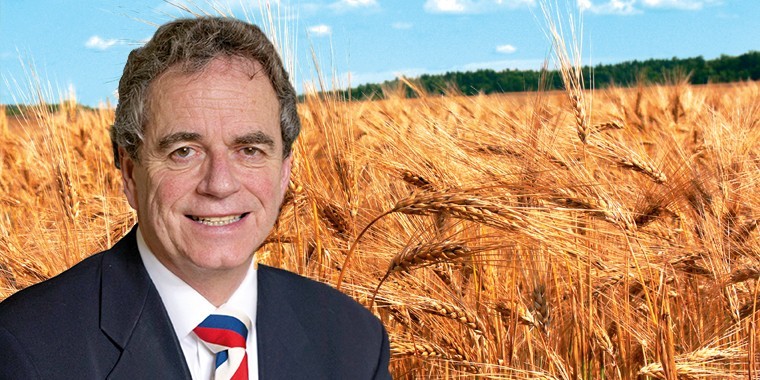For most of February and March so far, the grain market has moved down and sideways at best. Compound feed demand has slowed down and flour millers, having filled their books with imported German grain, don’t want anything until July. There is very little grain left on farm and that is the same in the EU and America, where end of season stocks of wheat, maize and soya will be very tight indeed.
We have no up-to-date figures, but the UK still needs to import a lot of maize and wheat between now and July. Stronger sterling has helped this, but still the price at the port for wheat and maize is high compared to the technical value of ex-farm wheat. End users are still buying hand to mouth as they are expecting a rebound in demand when the Covid-19 lockdown is relaxed, yet no one knows exactly when that will be.
China continues to confuse us all. One minute it is saying that it aims to feed 95% of its people by home growing 95% of its cereals, then this week it’s back again buying another two to three million tonnes of maize for April shipment and so is well on the way to importing 25 million tonnes plus, as opposed to the 7 million tonnes anticipated. The debate goes that having re-stocked their pig herds, which are now living in comfortable high rise stys, they must keep importing to maintain them. Others say it’s all cosmetic ahead of trade talks with the USA and that they may just walk away and cancel their contracts later, but I cannot see that. Whenever the price drops, China always seems to have room to buy and import.
Russia is equally perplexing. It’s high export tax on wheat has frightened off most buyers, so in the short term it achieved its aim of keeping wheat in the country to reduce wheat and flour prices. Only it hasn’t really reduced flour and bread prices yet.
Russia has an election in September, so the brief is to reduce price inflation at any cost by then. Their ‘floating tax’ is so open ended, with all the risk for the export buyers account, that forward business has stopped. Apart from the obvious question, how will they manage their harvest if they cannot export in August and September? Russia is the barometer for the world feed wheat price, so who is going to support that demand instead, and what effect will it have on harvest wheat prices around the world?
From this September the UK can increase its ethanol inclusion rate in petrol from 5% to 10%. By January 2022 we will return to two plants producing ethanol. At its last peak in 2017, 1.4 million tonnes of wheat was used in these plants. They can use maize as well as wheat, so this must increase demand on the balance sheet whatever happens. However, with most initial estimates suggesting an exportable surplus of only 1.5 million tonnes of new crop UK wheat at best, we may already be looking at balanced supply and demand. Back in 2017 this meant that wheat in the south of England had to be moved by lorry or boat to the deficit area created in the north, and this could happen again.
Spring barley plantings have now caught up and are finished in France and well on their way in Germany. In the south about 75% has been done on the better land, but even on the chalk some farmers are waiting for the soil to warm up a bit more yet.
The UK will have an exportable barley surplus, so some feed barley is being traded forward. Prices are closer to wheat than they have been this year, with malting premiums of £20 to £25 per metric tonne. Apart from the weather in Argentina and Brazil, which has not been good for the maize crops, we have not yet had a proper weather story anywhere in a major producing area. My instinct tells me that we will get one somewhere. Most big weather problems happen between May and July in places like Russia and the Ukraine or with maize plantings stateside in May and June. So, on that basis alone I’m keeping my powder dry for now.
Nor do I think we have seen the last of spikes in old crop prices, with world maize stocks at new lows, ongoing Chinese demand and maybe UK demand for ethanol. I think maize will hold the key to new crop grain prices, and as we all know, where maize goes wheat and barley follow.
Oh, in case you missed it, Wales beat England to win the Triple Crown although the Grand Slam eluded them following a very, very late try in France.




